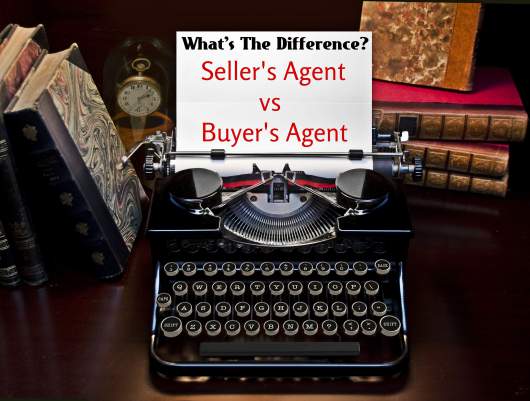 Skill Set Differences Between Buyers and Sellers Agents
Skill Set Differences Between Buyers and Sellers Agents
Did you know there is a significant difference between a buyer’s vs. a seller’s agent?
The differences go way beyond who they represent.
The agents representing the buyers and sellers share common objectives: securing the best deal for their clients and completing the home sale. However, their roles and obligations throughout the process vary.
There are almost always some profound skill differences between Realtors who work with buyers and those who work with sellers.
When most people think of a real estate agent, they think of someone who works with buyers and sellers of homes and other property.
For most purposes, this definition is accurate.
However, there are areas of specialization in the real estate field, including agents who work just for buyers and agents who work exclusively for sellers.
Understanding these distinctions is essential when you are looking to buy or sell a home. You want someone working for you that can accomplish your goals. The saying jack of all trades and master of none can apply to the real estate industry.
What a real estate agent does for buyers and sellers is quite different.
If you are selling a home, look for a listing specialist. When you buy a home, look for a skilled buyer’s agent.
If you are selling a home and choose an agent who works with both buyers and sellers regularly, you could be asking for trouble!
There is a massive difference between a real estate agent working with sellers and buyers!
The Definition of a Buyer’s and Seller’s Agent in Real Estate
The roles and responsibilities of a buyer’s agent and a seller’s agent are distinct and tailored to the specific needs of their clients.
A buyer’s agent, also known as a buyer’s representative, represents the buyer’s interests throughout the home-buying process. Their primary responsibility is to help the buyer find the right property, negotiate the purchase price, and guide them through the closing process.
Buyer’s agents often conduct market research, show properties, and provide valuable insights into the local real estate market to help clients make informed decisions.
Here are excellent questions to ask when interviewing a buyer’s agent.
On the other hand, a seller’s agent, also known as a listing agent, represents the seller in the home-selling process. Their primary focus is on marketing the property, attracting potential buyers, and negotiating the best possible price and terms on behalf of the seller.
Seller’s agents may advise their clients on staging the property, setting the listing price, and handling offers and negotiations to ensure a successful sale.
These are the questions to ask when interviewing a seller’s agent.
You will sign a listing contract with a seller’s agent and possibly a buyer’s agency agreement with a buyer’s agent.
While both buyer’s and seller’s agents are licensed real estate professionals, their roles are distinct and tailored to the unique needs of their clients. A selling agent vs a buying agent is different.
Whether you’re buying or selling a property, working with the right agent can make a significant difference in achieving your real estate goals.
Fundamental Differences Between a Buyer’s Agent and a Seller’s Agent
 Considering how much money may be on the line when buying or selling a home, you want to know that the Realtor you hire is best equipped to do what you need.
Considering how much money may be on the line when buying or selling a home, you want to know that the Realtor you hire is best equipped to do what you need.
Over the years, I have seen numerous consumers who do not understand the radical differences between the roles and skills a real estate agent should possess, depending on which side of the fence they are on.
This leads to mistakes in choosing the right Realtor for the job. Here is a typical scenario of what I am referring to:
Examples of Types of Agents
In this example, a homeowner will sell their property and decide to interview three agents. Interviewing multiple agents, by the way, is something all sellers should consider. Those who make poor choices generally don’t.
- Agent A derives 90% of its business from working with sellers.
- Agent B derives 90% of its business from working with buyers.
- Agent C does nearly an equal amount of business working with both.
Assuming all three agents are competent, agent A will always be the best choice.
Agent A has a business model for successfully handling what is required to market homes. They will have a robust real estate marketing plan for selling.
Agent B doesn’t do much business working with sellers, so their skill set favors understanding a buyer’s needs.
You may be thinking, what about agent C? They collaborate with a mix of both. It sounds like they could be a well-rounded agent, right?
Most of the time, the answer would be NO – they would not be a better choice than agent A.
Agent C will not have the time to do an exceptional job with their seller clients if they show homes daily.
Keep in mind Agent C works with a lot of buyers. Buyers take a tremendous amount of your time. If an agent is out all day showing homes, how in the world could they possibly do what is necessary from a marketing standpoint? Most can’t be, as they get spread too thin.
An Excellent Seller’s Agent Focuses On Representing Sellers
This is why a good agent who works with sellers often has a few buyer agents they rely on to refer business to within their office. When you are marketing homes well, it goes without saying your efforts will draw buyer calls.
A good seller’s agent will not drop everything they are doing and show homes every time a customer calls. If you have ever sold a home and had difficulty reaching your agent, this is probably why!
Agents with a good, sound business model will pick up the phone and refer the buyer to someone who specializes in working with buyers. This is a win-win for the agent as they get a referral fee but also can stay focused on working with their seller client.
Open Houses Are Not a Focus
Another excellent example of the difference between a great listing agent and a selling agent is the thought process surrounding an open house. The public open house is one of the oldest and most archaic forms of marketing in real estate.
A top producing agent will not waste their time doing open houses. A dirty little secret in real estate is that open houses rarely benefit a seller. They help the agent holding the open house to generate additional buyer clients so that they can sell homes elsewhere.
A listing agent dedicated to ensuring their client’s homes sell has little interest in generating buyers to work with.
A couple of years ago, I interviewed an owner who was selling their home in Milford, Massachusetts. The seller ended up choosing another agent because they touted open houses. This agent did not do much business, and the house failed to sell.
The seller hired me a few months later and admitted to me what a mistake they made.
The agent could never be reached and didn’t return phone calls until the end of the day. The lack of communication was because the agent was always out with buyers and not focused on working with seller clients.
As a homeowner, you need to understand the skill sets a real estate agent should possess, whether working with a seller or a buyer. Take a look at the outline below.
Here are some critical differences in what each does:
Seller Agent Qualifications
Pricing Skills
 One of the most critical skills a listing agent must possess is the ability to value a property accurately. When a seller consults with a real estate agent, they expect and deserve an accurate value estimate.
One of the most critical skills a listing agent must possess is the ability to value a property accurately. When a seller consults with a real estate agent, they expect and deserve an accurate value estimate.
Part of excellent representation is providing the advice a seller must hear.
Nothing will kill a home sale quicker than an overpriced home. Most agents who specialize in working with sellers will have a firm grasp of determining market value, as this is what they do all week.
Accurate house pricing is a skill and an art.
An unrealistic seller will not sway a top-notch Realtor who knows their stuff. The best of the best will walk away from a listing they know is overpriced.
An agent who works with many buyers may not have that same rigidness, as they will use the listing to get buyer calls to sell other properties.
After all, working with buyers is their specialty, not sellers!
Homeowners who listen to the wrong real estate agent can end up with an overpriced listing that doesn’t sell. Ultimately, the owner will sell their home for less than if priced realistically from day one.
Marketing Skills
Marketing is one of the most vital strengths of an agent representing a seller. A listing agent has to know how to market your home. This is a complex set of skills that take years to develop fully.
There is a significant difference between buyers’ vs. sellers’ agents on this front.
Not only does it take time to create an efficient marketing network, but it also takes a bit of innovation to stay on top of the changing marketing landscape.
Gone are the days when the average listing agent could throw a sign up in the yard and put some ads in the newspaper.
Marketing houses today require a comprehensive strategy to get positive results.
This includes “enhanced” listing displays on all the online sites buyers most often frequent. A top seller’s agent will also offer real estate marketing with creativity. Everything they do should be geared to making your home stand out!
An Exceptional Real Estate Website For Marketing Homes
Every business today understands the need for a web presence to excel. Real estate agents and seller’s agents, in particular, need an excellent website to advertise the homes they sell.
The site must be easy to navigate and offer comprehensive information on the homes they are marketing. Even more importantly, the site should have a decent search engine ranking if it hopes to be seen by home buyers.
You can have the greatest-looking website around, but if nobody can find it, it’s pointless.
Understanding The Importance of Fantastic Photography
Whether the agent takes the photos or hires someone to do it, the importance of good photography cannot be overstated. When a buyer is looking for houses online, they see the pictures included in the listing.
If the pictures are shoddy, they will make the property look unappealing. This will naturally repel potential buyers and hurt the sale. An exceptional seller’s agent understands the critical nature of how well a home needs to be presented online.
A home presentation can make or break a real estate transaction. Most top-notch listing agents will not be taking their photos. They will invest the money in having a professional handle them.
The quality of photography provided should hold much weight when selecting a Realtor.
Massachusetts Realtor and photographer, Kevin Vitali states “sellers who don’t look at an agents photography online are making a significant mistake.
You always want to understand the level of importance a seller’s agent places on photos. The buyer surely will! A surfire home selling mistake is choosing agents who don’t care.”
Kevin has an excellent article on the role of photography in home sales.
Honesty at All Costs
When people go to sell their home, it is easy to get caught up in the emotional history of the property. You may have raised a family there or improved the home you are proud of.
Naturally, these factors will get you to see your house as being the creme of the crop – even if the market may not reflect your perspective. Your listing agent must have the courage and insight to explain this.
Overpricing a home is never a good idea and can cause problems when trying to sell. The agent needs to provide honest feedback on your expectations so the house can sell and you can walk away happy.
A seller’s agent should not be afraid to tell you that your favorite wallpaper needs to go and the pink bathroom you love is no longer in style.
A YES man or woman who agrees with everything you say is not what you want. Objective opinions based on experience at selling homes are what you should have.
A Sound Feedback System
A skilled seller’s agent should have a system that allows you to get feedback from buyer’s agents after your property has been shown. When a showing occurs, you will want to understand the buyer’s interest level and what they liked and disliked.
Someone specializing in working with sellers understands that feedback is critical to good communication throughout the home sale process.
They know that sellers want to be informed of the progress of their home sale. A seller’s agent also understands the feedback is valuable to make necessary adjustments.
On all my property sales, my clients get feedback from buyer’s agents through Showing Time. Showing time is a dedicated showing scheduling and feedback system.
They provide access to homes by scheduling showings directly with a homeowner. All the parties are then notified upon confirmation.
Within 24 hours, my clients will get feedback on how the buyer feels about the property. There are numerous benefits, including sellers planning any needed adjustments.
Interesting Fact: Around 92% of sellers who work with a dedicated seller’s agent report higher satisfaction with the selling process.
Buyer Agent Qualifications
An outstanding buyer’s agent does many things for their clients.
Understands Towns and Neighborhoods
 When you are looking to buy a house, you must have as much accurate information as possible. Agents that help buyers find homes should know their towns inside and out, down to the level of individual neighborhoods.
When you are looking to buy a house, you must have as much accurate information as possible. Agents that help buyers find homes should know their towns inside and out, down to the level of individual neighborhoods.
You can’t help a person find their dream home if you don’t know where to look.
A good buyer’s agent will understand critical differences between one neighborhood and the next that can affect market value.
The best buyer’s agents will advise buyers on picking a neighborhood when buying a house.
They will know of areas with high crime rates and others that are highly desirable.
Possesses Knowledge of Local Property Values
A buyer agent must have a firm grasp of what different properties are worth. This calculation varies from home to home but will probably include factors like location, school district, square footage, number of bedrooms, number of bathrooms, and all the various amenities found in a home.
To make things even more complicated, the agent must understand the value of all these different factors based on where the house is in the particular city.
Strong Negotiation Skills
Once the agent helps you find the home you want, it is time for negotiations to begin.
If you have ever haggled at a flea market, you have some idea of how bargaining can go – except with a home, where you are negotiating over much more valuable merchandise.
You want an agent with a good history of getting what their clients want at the negotiating table. You also want an agent to help you understand what to fight for and concede.
There is, of course, some overlap of the skills necessary for representing buyers and sellers. For example, every real estate agent needs to have the ability to understand how market value is calculated so they can adequately represent their client.
If you don’t possess this skill, you might as well quit and do something different. Frankly, many real estate agents don’t belong in the business, but that is an article for another day.
The Perfect Example is Negotiating Home Inspections
The best real estate agents will also have good negotiating skills as they represent their respective clients. Not only at the initial stage when an offer is made but also when home inspection items need to be negotiated.
This can be one of the most stressful points in a transaction, but it needs to be managed with a solid head on your shoulders.
You certainly don’t want a drama queen. An agent who can keep both sides on track and come to a meeting of the minds is vital.
Lastly and most importantly, both a buyer’s agent and seller’s agent owe their clients undivided loyalty, disclosure, reasonable care, obedience to lawful instruction, confidentiality, and accountability.
Unfortunately, some of the less professional agents in the industry don’t understand this concept. While in the minority, these agents think only about one thing – their pocketbook.
This is the type of agent you want to stay clear of! You should accept nothing less than an agent earning their commission.
Pick the Right Agent for Your Needs
 If you are buying a home, you will most likely get the best experience working with a buyer’s agent. This person will already be helping other buyers find homes and negotiate good deals.
If you are buying a home, you will most likely get the best experience working with a buyer’s agent. This person will already be helping other buyers find homes and negotiate good deals.
They should have a strong understanding of the towns and neighborhoods you have expressed interest in. The agent you are working with must also have a sense of specialized purchases.
For example, a good buyer’s agent will know the right questions to ask when buying a lake home. Locating on a lake adds a different layer of purchase considerations, as we will see in our guide.
Another good example would be when purchasing a condo. There are different considerations a buyer should have when buying a single-family home.
Only a well-rounded buyer’s agent understands the dramatic differences that must be considered in these transactions.
Educating a buyer on these things separates a genuine buyer’s agent from someone who shows homes.
If you sell a home, you must work with a top listing agent. Getting a buyer agent to sell your home is asking for unnecessary complications.
If they are out on the road showing houses, it will make it very difficult to do the necessary day-to-day marketing tasks or to provide you with the one-on-one feedback and steady communication you need to get the house sold.
Conclusion
Understanding a buyer’s agent vs. a seller’s agent is imperative. Whether buying or selling, pick the right agent for your needs, and you will surely be better off in the long run. It would help if you asked the agent you are considering how much business they derive from each.
Without doing so, it leads to poor agent choices. You’ll likely be heading to Google to learn how to fire your agent. Your agent’s work should be heavily skewed towards sellers when selling and buyers when buying.
About the Author: Bill Gassett, a nationally recognized leader in his field, provided information on the difference between a buyer and seller agent. He is an expert in mortgages, financing, moving, home improvement, and general real estate.
Learn more about Bill Gassett and the publications he has been featured in. Bill can be reached via email at billgassett@remaxexec.com or by phone at 508-625-0191. Bill has helped people move in and out of Metrowest towns for the last 38+ years.
Are you thinking of selling your home? I am passionate about real estate and love sharing my marketing expertise!
I service Real Estate Sales in the following Metrowest MA towns: Ashland, Bellingham, Douglas, Framingham, Franklin, Grafton, Holliston, Hopkinton, Hopedale, Medway, Mendon, Milford, Millbury, Millville, Natick, Northborough, Northbridge, Shrewsbury, Southborough, Sutton, Wayland, Westborough, Whitinsville, Worcester, Upton, and Uxbridge MA.


